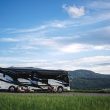Usually, you’d visit our site for tips about RVing in the USA. But you might be feeling inspired to take the RV on up to Canada after our article about where to RV internationally. Or you know you’ll need to cross through The Great White North to visit all the places on our list of things to do in Alaska. We can’t blame you either way! Despite the excitement that awaits, those aspirations to visit our northern neighbors might come with some apprehension about what it takes to cross the border in an RV. Luckily, it’s not as complicated as you may think! And we have a guide to breaking it all down for you. Here’s everything you need to know before traveling to Canada in Your RV.
Everyone Needs a Passport
Yes, you do need a passport to cross into Canada. If you’ve never had a passport before, a first-time application will cost $110. You’ll also need to get your photo taken at a passport photo location like the post office, a drugstore that offers passport photo services, or certain travel agencies. Once you submit your paperwork, it will take about 6-8 weeks to come in. The only exception of travel to Canada is that children under 16 can use birth certificates as border crossing paperwork. However, traveling with a child you share custody of will require additional paperwork. Make sure that you have everyone’s passports ready to go when you pull up to the border agent’s window. Double and triple before you leave that you have everyone’s passports in the vehicle and ready to go.
Have Your Proof of Insurance and Registration Ready
In addition to passports, you’ll also need your proof of insurance and registration for your vehicle. They may not ask for this documentation, but it is required both entering Canada and re-entering the United States. So make sure it’s in the vehicle before you leave home.
Be Aware that “Truck” Lines Are for Tractor Trailers
The signage can be confusing and there are rarely signs that say “RVs go here” – but for the sake of border crossing, your vehicle is considered a car. The lines for “trucks” are most often referring to 18-wheelers crossing commercially. You don’t need to be in that line.
Give Yourself Plenty of Time – And Then Some
There’s no predicting exactly how much time it will take to cross the border. If you’re in an urban area, sometimes crossing during rush hour can take a long time because of commuters that work across the border. In rural areas, your border crossing may be longer than usual because they have smaller staffs. The key is to never arrive at the border in a hurry or with an agenda to be somewhere by a certain time.
Sometimes crossing is as easy as answering 4 or 5 questions and being on your way, and other times a border agent will board your vehicle and do an extensive search. These searches can be random but don’t be shocked if you get pulled for one (either leaving or re-entering the USA). Be prepared for the border agent to go through every cabinet and cubby in the RV, and to sometimes leave it a mess after they’re done. It just comes with the territory.
Answer Questions Seriously and Honestly
The border agents’ questions can feel intimidating and prying – because they’re supposed to. Their job is to get the bad guys to crack. And even though you have pure intentions when you travel, humor isn’t the way to convey that. The best thing to do is to take their questions seriously when they ask things like the purpose of your trip, how long you are staying, who you work for or if you have anything to declare. When you have nothing to hide, honesty is the best policy and will go a long way with the agents you interact with.
Declare Your Pets
If you’re traveling with a furry friend into Canada when the border agent asks if you have anything to declare, you’ll want to mention your pet. For most animals, a rabies vaccination certificate is required, so be sure to have the proper certificate on hand that has been issued by a licensed veterinarian and lists the vaccination date and duration as well as the trade name and a serial number of the vaccine.
A health certificate is not required for traditional pets but it’s not a bad idea to bring one along just in case. If your pet looks sick, the border agent may ask more questions. Traveling with non-traditional pets like birds and reptiles may require some extra paperwork so be sure to read up on the requirements on the Canadian government website to know what’s required before you travel. Be aware that Ontario has an anti-bully breed law that prevents pitbull-type dogs from traveling in the province.
Declare Perishable Food, Firearms and Weapons
This is where things get a bit more complicated for RV travelers than other drivers crossing in cars. RVers are often traveling for extended periods. Bringing along food for the trip. And in some cases, equipment for outdoor activities like hunting. You’ll need to keep in mind the need to declare certain items when you’re packing for your trip. Non-perishable food items aren’t usually an issue. Bringing things like meat, dairy, fruits, and vegetables across the border can get dicey. There are also limitations on how much alcohol and tobacco you’re allowed to cross with as well.
Be sure to read up on the restrictions. And if you can, plan to buy your perishable foods after you cross the border. As far as weapons go, Canada is very strict with this. If your weapon is on the list of weapons allowed, it must be declared. You need the registered paperwork along with a permit fee. It also must be locked away, separate from the ammunition. Leaving weapons at home when you travel to Canada is the simplest way to do it. But if you must cross with weapons, be sure to read up on the restrictions thoroughly before doing so.
Everything You Need to Know Before Traveling to Canada in Your RV
Now that you have the guide on how to do it, there should be nothing holding you back from experiencing Canada in your RV! As long as you bring your patience along for the border crossing process, you will be just fine. There are hundreds of new places north of the border just waiting for you to explore and enjoy!






